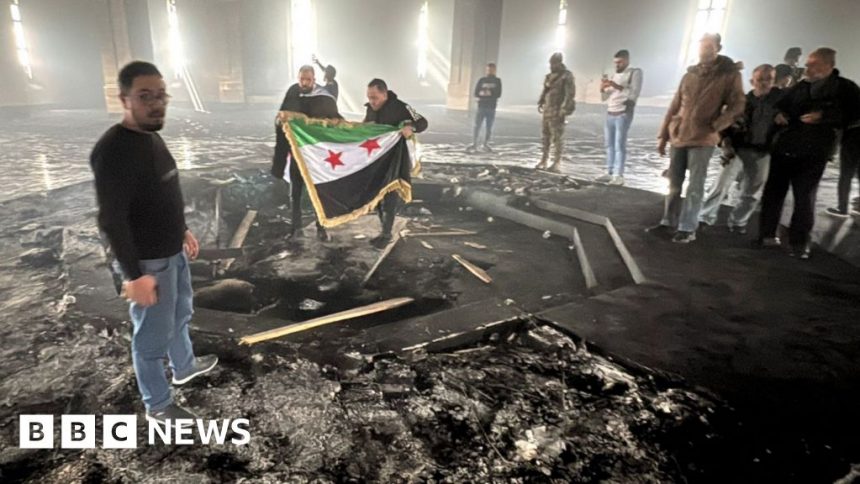Syria rebels burn tomb of Bashar al-Assad’s father
Syrian rebel fighters have destroyed the tomb of late president Hafez al-Assad, father of ousted president Bashar, in the family’s hometown.
Videos verified by the BBC showed armed men chanting as they walked around the burning mausoleum in Qardaha, in the north-west of the coastal Latakia region.
The rebels led by Islamist group Hayat Tahrir al-Sham (HTS) swept across Syria in a lightning offensive that toppled the Assad dynasty’s 54-year rule. Bashar al-Assad has fled to Russia where he and his family have been given asylum.
In other key developments:
- Iran’s Supreme Leader Ayatollah Ali Khamenei has blamed the fall of the Assad regime on the US and Israel, as well as an unnamed “neighbouring state” of Syria
- Israel has continued to target the Syrian military’s arsenal, according to the UK-based Syrian Observatory of Human Rights (SOHR), which reports more than 350 Israeli air strikes on Syrian provinces since Sunday
- The Israeli government has said those who now control large parts of Syria should not have the means to threaten Israel, while Arab states have criticised the air strikes
- Syrian rebel forces say they have taken control of the oil-rich eastern city of Deir al-Zour from Kurdish forces
Statues and posters of the late president Hafez and his son Bashar have been pulled down across the country to cheers from Syrians celebrating the end of their rule.
In 2011, Bashar al-Assad brutally crushed a peaceful pro-democracy uprising, sparking a devastating civil war in which more than half a million people have been killed and 12 million others forced to flee their homes.
Hafez al-Assad ruled Syria ruthlessly from 1971 until his death in 2000, when power was handed to his son.
He was born and raised in a family of Alawites, an offshoot of Shia Islam and a religious minority in Syria, whose main centre of population is in Latakia province near the Mediterranean coast close to the border with Turkey.
Many Alawites – who make up about 10% of the country’s population – were staunch supporters of the Assads during their long stay in power.
Some of them now fear that they may be targeted by the victorious rebels.
On Monday, a rebel delegation with members of HTS and another Sunni Muslim group, the Free Syrian Army, met Qardaha elders and received their support, according to Reuters news agency.
The rebel delegation signed a document, which Reuters reported emphasised Syria’s religious and cultural diversity.
HTS and allied rebel factions seized control of the Syrian capital Damascus on Sunday after years of civil war.
- Russia ships move from Syria base amid doubts over future
- Israel seizes on chaos to strike military assets in Syria
HTS leader Abu Mohammed al-Jolani, who has now started using his real name, Ahmed al-Sharaa, is a former jihadist who cut ties with al-Qaeda in 2016. He has recently pledged tolerance for different religious groups and communities.
The UN envoy for Syria has said the rebels must transform their “good messages” into practice on the ground.
The US secretary of state meanwhile said Washington would recognise and fully support a future Syrian government so long as it emerged from a credible, inclusive process that respected minorities.
HTS has appointed a transitional government led by Mohammed al-Bashir, the former head of the rebel administration in the north-west, until March 2025.
Bashir chaired a meeting in Damascus on Tuesday attended by members of his new government and those of Assad’s former cabinet to discuss the transfer of portfolios and institutions.
He has said it is time for people to “enjoy stability and calm” after the end of the Assad regime.
 BBC/Sophie Williams
BBC/Sophie WilliamsIn Damascus, BBC correspondents have been seeing signs of life beginning to return to normal, with people heading back to work and shops reopening.
Joud Insani, who works in a chocolate shop in the Syrian capital, tells the BBC she was able to open “without fear”, adding that she had noticed a welcome change in the types of customers who visit.
“We reopened without fear because the people we serve are now not intimidating at all,” she said.
“Before, everyone who came to buy from us was either there to represent a general or a minister loyal to the Assad regime. Now thank God, that is no longer the case.”
In one of the famous food food and vegetable markets of Damascus, one salesman tells the BBC: “Now we have oxygen in the air.” While another man noted there was “ongoing celebration from now on”.
In the neighbourhood of Joubar, emotional reunions have been taking place in the old opposition stronghold, more than 90% of which has been destroyed.
Monawwar al Qahef and her husband Muhammad returned for the first time in 12 years. The couple cried when they saw their two-storey house, which has been reduced to a pile of concrete rocks around a single arched wall.
“This is the first time we dared to come back,” Muhammad said. “I feel as if it’s me that has been broken into pieces.”
With additional reporting from Sophie Williams and Lina Sinjab in Damscus







